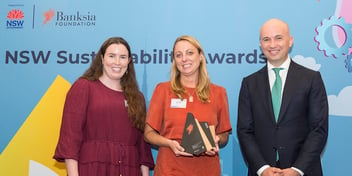Sydney Water testing for COVID variant
With the COVID-19 delta variant instigating lockdowns across the country, water utilities’ tracing efforts are back in the spotlight, with Sydney Water playing a key role in supporting the NSW government in the race to contain the outbreak.
Since July 2020, Sydney Water has been working with NSW Health to test wastewater samples for fragments of the virus that causes COVID-19, as part of the NSW Government COVID-19 sewage surveillance program.
“So far we’ve conducted nearly 5000 tests and there’s been more than 250 detections through the sewage surveillance program,” a Sydney Water spokesperson said.
“In Sydney, testing is undertaken from our 25 wastewater treatment plants and 37 network sites. In addition, we’ve also been supporting regional NSW by testing samples collected by local councils at 40 wastewater treatment plants across the state.”
The method developed to test wastewater for fragments of COVID-19 has been successful in detecting all the variants thus far, including the most recent delta variant. But testing wastewater for viruses still poses many challenges.
“When case numbers are low in the community, because of massive dilution in wastewater, virus numbers will be extremely low. Wastewater also contains lots of compounds that can interfere with virus detection,” the spokesperson said.
“So, the method must be highly sensitive to detect low levels of viruses.”
Every week Sydney Water collects 500ml samples of wastewater across its network. The samples are brought to the utility’s West Ryde labs where scientists conduct a three-step process to test for fragments of COVID-19.
“The virus numbers in wastewater can be very low. First we use a special membrane filtration technique to concentrate the virus from sewage,” the spokesperson said.
“During the extraction step, the virus genetic material — RNA — is separated out and purified using different chemicals. Then the final detection step is to check and see whether the molecular markers of COVID-19 are present in the sample.
“If they are present, millions of ‘copies’ will be made to enable detection and the PCR machine will tell us how many copies of the molecule fragments are presented in the sample.”
Better detection
Sydney Water has continued to evolve the testing process over the past year, with new technology helping speed up parts of the exercise.
“With the assistance of new technology, known as a QIAcube machine, Sydney Water’s scientists have been able to almost halve the time it takes them to complete the extraction phase when testing wastewater for fragments of COVID-19,” the spokesperson said.
“The machine can automate the separation and purification of genetic material — RNA — of COVID-19 virus fragments from wastewater samples.
“This has allowed for the number of samples processed each week to be almost doubled – to up to 150 per week. This means we can increase laboratory analysis and turn around more test results for NSW Health when required.”
All results taken from across the state are reported to NSW Health within 48 hours.

